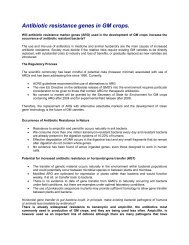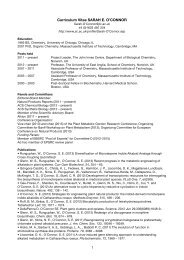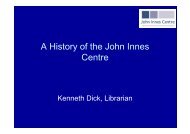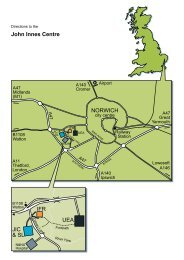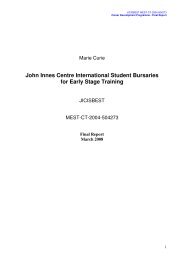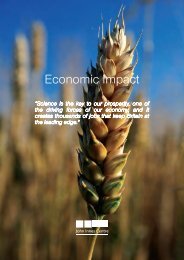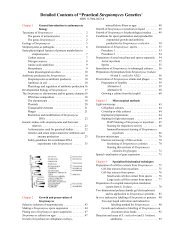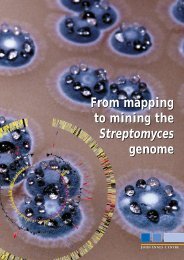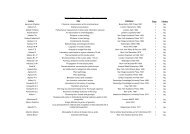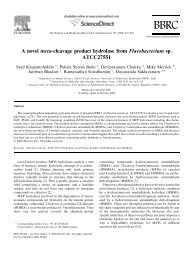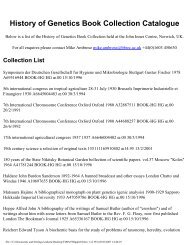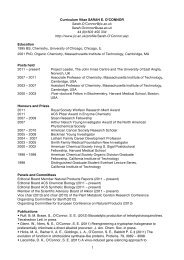1910s Timeline - John Innes Centre
1910s Timeline - John Innes Centre
1910s Timeline - John Innes Centre
You also want an ePaper? Increase the reach of your titles
YUMPU automatically turns print PDFs into web optimized ePapers that Google loves.
On the Lysenko affair:<br />
http://www.sciencedirect.com/<br />
science?_ob=ArticleURL&_udi<br />
=B6V81-4HGM724-<br />
4&_user=1549459&_rdoc=1&_f<br />
mt=&_orig=search&_sort=d&vi<br />
ew=c&_acct=C000053657&_ver<br />
sion=1&_urlVersion=0&_userid<br />
=1549459&md5=2daa3363ff7b<br />
c318d601061b6b5ef2a5<br />
Darlington’s BBC broadcast on<br />
the Lysenko affair with R. A.<br />
Fisher, S. C. Harland and J. B. S.<br />
Haldane on 30 November 1948<br />
was reported in The Listener, 9<br />
December 1948, pp. 873-876.<br />
1947 CD Darlington and R A<br />
Fisher found the journal<br />
Heredity<br />
C D Darlington co-founds<br />
Heredity: An International<br />
Journal of Genetics with the<br />
biological statistician Ronald<br />
Fisher. They address this new<br />
journal to botanists and<br />
zoologists with interests in<br />
evolution and systematics; to<br />
physiologists (cytology and<br />
experimental technique); to<br />
medical researchers (diagnosis<br />
and treatment); to social<br />
scientists studying nature and<br />
nurture; to agriculturalists<br />
engaged in plant and animal<br />
breeding and finally to<br />
physicists and chemists seeking<br />
to bridge the gap between their<br />
sciences and biology.<br />
Underlying this broad appeal is<br />
the belief that genetics is a key<br />
causal framework for biology,<br />
social sciences and medicine.<br />
Darlington and Fisher are selfconsciously<br />
striking out the<br />
narrow limits of Bateson’s<br />
Journal of Genetics. Privately<br />
Darlington is also motivated by<br />
difficulties getting his own work<br />
published in peer-reviewed<br />
journals (paralleling Bateson’s<br />
early experiences). Some of his<br />
submissions have been rejected<br />
as too cytological for Journal of<br />
Genetics, not experimental<br />
enough for Journal of<br />
Experimental Biology or have<br />
been excluded from the<br />
Proceedings of the Royal Society<br />
by hostile reviews from his rivals<br />
<strong>John</strong> Farmer and Reginald<br />
Ruggles Gates. Additionally<br />
Darlington wants to be able to<br />
publish his judgements on a<br />
range of issues uncensored.<br />
Fisher is deeply interested in the<br />
project, especially explorations<br />
of genetics and man, but it is<br />
Darlington who effectively acts<br />
as editor of the new journal.<br />
See also:<br />
Dan Lewis, ‘Cyril Dean<br />
Darlington 1903-1981’,<br />
Biographical Memoirs of Fellows<br />
of the Royal Sociey, 29 (1983):<br />
113-157, on p. 145.<br />
O. S. Harman, The man who<br />
invented the chromosome: a life<br />
of Cyril Darlington, Cambridge,<br />
Mass.: Harvard University Press,<br />
2004, pp. 207-10.<br />
Page 44 of 91



